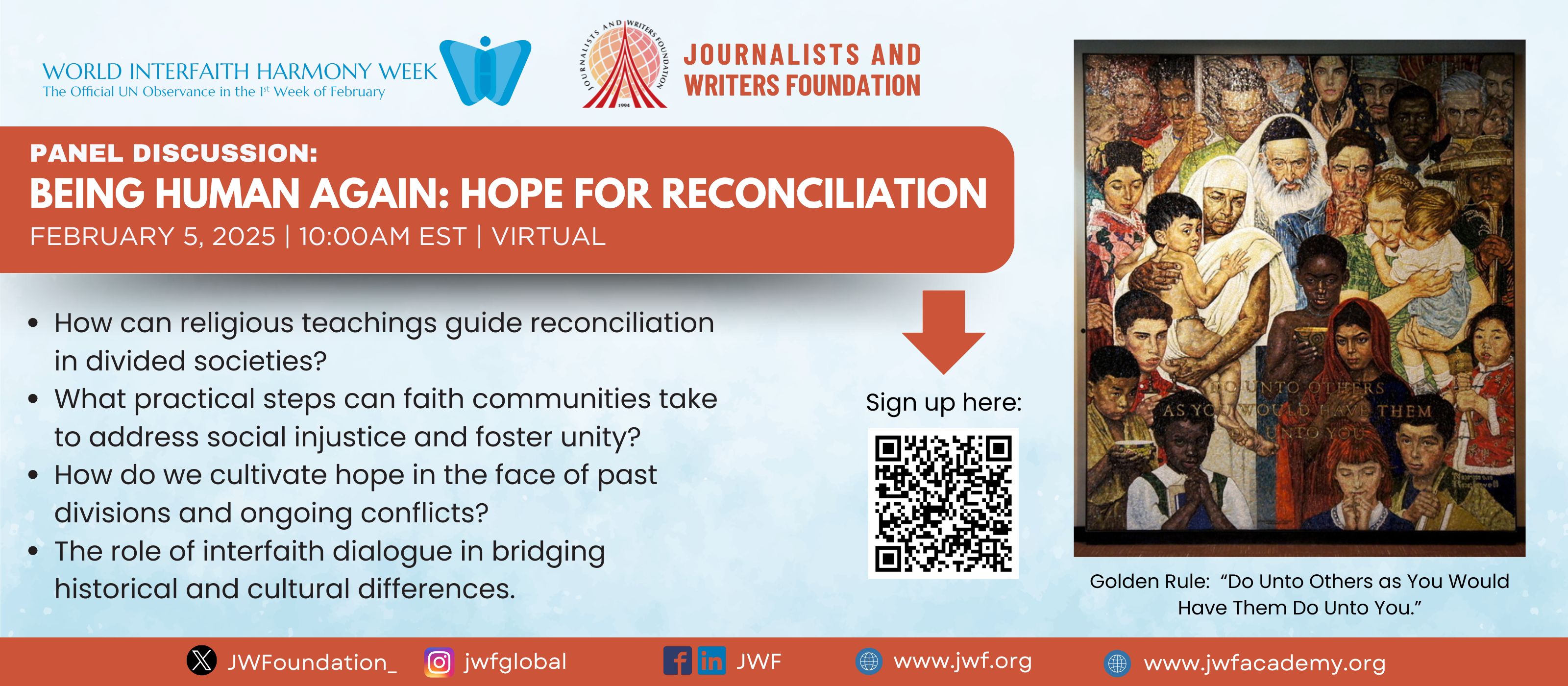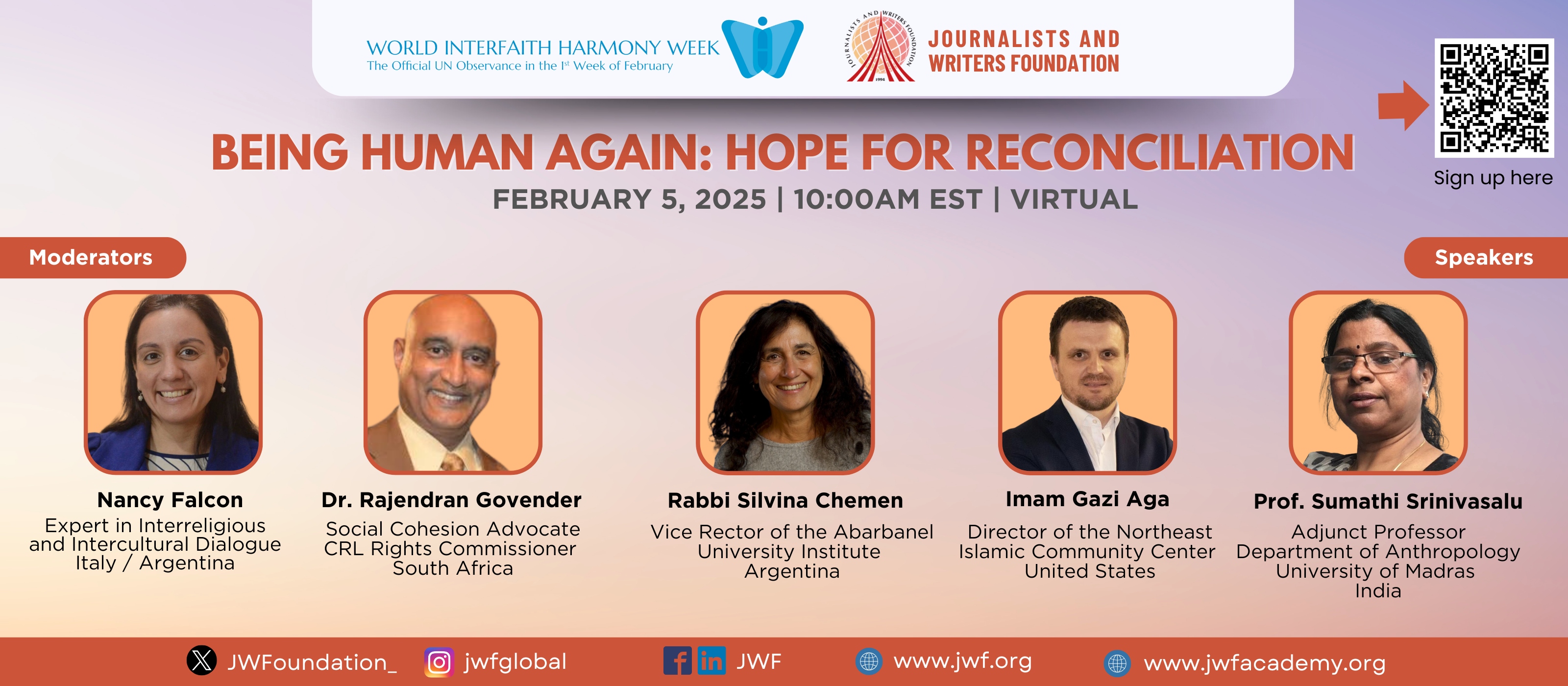JWF Panel – Being Human Again: Hope for Reconciliation
Report on World Interfaith Harmony Week 2025 Event: "Being Human Again: Hope for Reconciliation"
Event Details
Title: Being Human Again: Hope for Reconciliation
Date: February 5, 2025
Time: 10:00 AM EST
Format: Virtual Event Summary
On the occasion of the World Interfaith Harmony Week 2025, the Journalists and Writers Foundation (JWF) organized a virtual discussion entitled: “Being Human Again: Hope for Reconciliation” exploring the role of interfaith dialogue in fostering reconciliation, healing, and unity in divided communities. As societies grapple with the aftermath of wars, conflicts, inequalities, and misunderstandings, the need to rediscover our shared humanity is more pressing than ever.
Mehmet Kilic, President of the JWF opened the session by warmly welcoming participants from around the world. He extended his heartfelt appreciation to Dr. Rajendran Govender and Ms. Nancy Falcon, esteemed members of the JWF Interfaith Committee and Advisory Board, for their invaluable dedication in making this event possible. Mr. Kilic also expressed sincere thanks to the distinguished panelists Rabbi Silvina Chemen, Prof. Sumathi Srinivasalu, and Imam Gazi Aga, whose rich experiences from Argentina, India, Italy, the United States, and beyond would offer valuable insights on the role of interfaith dialogue in fostering reconciliation, healing, and unity. He emphasized the critical importance of collaboration in addressing shared challenges through interfaith and intercultural dialogue and said: “As we celebrate World Interfaith Harmony Week, our goal is to unite, collaborate, and foster solidarity to address our common challenges.”
In his opening reflections, Dr. Rajendran Govender, a Social Cohesion Advocate and a member of the Cultural, Religious and Linguistic Commission of South Africa, emphasized the significance of interfaith dialogue in fostering understanding. He stated, "This session is not just about discussion, it’s about rediscovering our shared humanity in a world increasingly divided by conflict and prejudice."
Nancy Falcon, a prominent expert in interreligious and intercultural dialogue and an International Fellow at KAICIID 2020, followed by highlighting the urgency of reconciliation in today’s world. She remarked, "Dehumanization has become a powerful tool to divide us, but religion, spirituality, and interfaith dialogue can help us reclaim what it means to be truly human." She stressed that reconciliation is not merely about resolving conflicts but about "fostering deeper connections, understanding, and collective healing."
Rabbi Silvina Chemen, Senior Rabbi at Beth El Congregation from Buenos Aires in Argentina, described the theme as a powerful call to reclaim humanity amidst the rise of inhumanity and the prevailing narratives of hatred in mass media. Rabbi Chemen emphasized that humanity must be strong enough to regain control over these narratives and remind society of the values of justice, love, and neighborliness, which are central to all religions.
She stressed the role of religions in promoting unity and reconciliation, not just through teachings but through action. “Religions were founded for love, truth, and unity,” she stated, encouraging faith communities to take their messages of kindness and justice beyond their sanctuaries and into everyday life. Rabbi Chemen further asserted that engagement in social issues is inherently political because not engaging is also a political stance. Faith, according to her, must be incarnated into daily actions, influencing all spheres of life, whether in neighborhoods, workplaces, or political discussions.
Regarding hope amidst division and conflict, she shared that hope is cultivated through acts of loving kindness and justice. “Hope is not an empty conception; it is a real decision to act in society,” she stated. Rabbi Silvina Chemen urged people to lead by example, demonstrating a balanced, loving approach even in controversial situations. She emphasized that polarization and binary positions lead nowhere, but embracing love and responsibility for others opens possibilities for a hopeful future.
Lastly, discussed how interfaith dialogue can bridge historical and cultural differences, noting that it leads to profound experiences in the lives of ordinary people, not just leaders. “We are complete when we understand that the expression of God is different in every religion, but it leads us to a shared sphere of faith, hope, and peace,” she concluded. Rabbi Chemen expressed gratitude for the opportunity to speak and encouraged everyone to take the messages of unity and understanding into their communities, countering divisive narratives.
In her presentation, Professor Sumati Srinivasalu, an Adjunct Professor at the Department of Anthropology at the University of Madras in India shared an anthropological perspective on the concept of interfaith, reconciliation, and belief systems, with an emphasis on how these elements play a crucial role in maintaining humanistic values within communities. She began by exploring the idea of religion as a belief system, which was shaped by early anthropological theories, particularly from scholars like Taylor, who introduced concepts such as animism and animatism to explain the origins of religion. Professor Srinivasalu highlighted that these belief systems are emotional and intuitive in nature, helping to foster communal living and social order, which are integral to human existence.
She provided two compelling case studies from Tamil Nadu, India, to illustrate how belief systems contribute to harmonious interfaith relationships. The first case involved the Nadar community, which has overcome historical struggles to change their social status from "untouchables" to a recognized group, illustrating how religion plays a unifying role within families, even in interfaith marriages between Hindus and Christians. In these families, religious practices were fluid, with individuals celebrating Hindu and Christian festivals together, reflecting the strength of local wisdom and cultural capital in maintaining community harmony.
The second case study focused on Dalit converts to Christianity, revealing a paradox in India’s legal and social systems. While these converts are denied certain benefits, such as reservations for scheduled castes, they continue to practice their belief systems in a way that integrates both Hindu and Christian elements, showing the enduring power of localized belief systems.
Professor Sumati concluded by emphasizing that, despite the complexities of structured religions, belief systems at the grassroots level, shaped by local culture and wisdom, often promote peace, compassion, and human values. Her analysis demonstrated how belief systems, rather than rigid religious structures, can foster social cohesion and economic growth, particularly in vulnerable and marginalized communities.
Imam Gazi Aga, the Director of the Northeast Islamic Community Center, focused on the importance of interfaith collaboration and the practical steps for promoting understanding and unity in society. Imam Aga introduced a collaborative initiative known as “The Three Amigos”, which was formed by a Catholic priest, a Rabbi, and himself, an Imam, in Connecticut. This initiative aims to bridge religious divides and foster unity among diverse groups by focusing on shared values and the concept of a common Creator. He highlighted the importance of faith in daily life, stating that it should not be confined to religious institutions but should guide individuals in their roles as better humans, workers, and family members.
He referenced a verse from the Quran, emphasizing the idea that humanity is one nation under God and that understanding one another is vital for peace. He also shared a saying from Prophet Muhammad, which calls for mercy toward others. Imam then shared the success of The Three Amigos initiative, which started in 2009 and has brought together diverse communities in interfaith dialogues, lectures, and community events. Their early events took place in synagogues, churches, and mosques, attracting hundreds of attendees from various faith backgrounds. Imam explained that the initiative is rooted in building sincere, everyday relationships based on shared faith and respect for diversity.
Imam Gazi Aga stressed the importance of local, grassroots initiatives in fostering peace and understanding, suggesting that small, sincere actions in local communities can have a significant impact. He encouraged people to celebrate diversity in their workplaces and communities through educational programs, shared service projects, and celebrations that promote friendship and trust. He concluded with a call to action: "The best of people are those who are most beneficial to others," and emphasized that embracing empathy and forgiveness is crucial in cultivating hope amidst divisions. Imam Gazi encouraged everyone to take the initiative in promoting interfaith dialogue and to remember the power of mercy, cooperation, and respect in creating peaceful communities.
In a Q&A Session following the panel discussions, the moderators facilitated a dynamic and insightful exchange with the audience. One of the questions posed was about the role of empathy in reconciliation, particularly in interfaith and intercultural dialogues. The panelists shared their thoughts on how empathy could be cultivated and applied to foster genuine healing and understanding. Rabbi emphasized that empathy is integral to reconciliation, highlighting that it stems from understanding and knowledge of others. Empathy is not just a passive feeling but requires active engagement, education, and effort, especially in interfaith dialogues. By teaching communities to learn about other religions and perspectives, empathy can be nurtured, which aligns with the core messages of many religious traditions, to love others and embrace differences.
Imam Gazi Aga agreed with the Rabbi Silvina Chemen, adding that empathy should be part of socialization practices, starting from the family level and extending to the wider community. He stressed that empathy must evolve naturally through everyday interactions and shared values, such as equality, equity, and social justice. In communities where empathy thrives, there is a greater sense of mutual respect and acceptance.
The discussion also delved into practical steps beyond dialogue to promote peace and social harmony. Prof. Sumathi Srinivasalu shared her experience working on a project funded by Volkswagen that focused on the concept of "safe spaces." Safe spaces allow for open, honest discussions, which can lead to tangible actions for reconciliation and community building. The data and insights gathered from these spaces can inform policymaking and help communities address their specific challenges.
A major theme in the conversation was the importance of translating theory into practice. The panelists discussed how faith and empathy must lead to action. Imam Gazi Aga emphasized that the foundation of action lies in genuine faith, which can be expressed through small but meaningful acts, whether by investing in education, supporting community initiatives, or simply fostering understanding through dialogue. He also highlighted that everyone has unique strengths, and each person’s contributions, no matter how small, are important for societal transformation.
When asked about the challenges facing societies today, particularly in relation to religious conflicts, the panelists agreed that the issue is multifaceted. They pointed out that in many democratic societies, religion has been sidelined in favor of political and economic concerns, which has led to a disconnection from spiritual and moral values. Imam Gazi Aga noted that when spirituality is neglected, it leaves a void, causing people to become disconnected from their core humanity. This disconnection, coupled with political agendas, has contributed to the global crises of division and misunderstanding. The panelists emphasized the need to re-engage with spirituality and ensure that the values of empathy, responsibility, and care for others are at the forefront of societal development.
In conclusion, the panelists urged for continued efforts in both dialogue and action. They agreed that reconciliation and peacebuilding require ongoing work, whether through empathetic listening, understanding different cultures, or taking concrete steps in the community. The message was clear: empathy is not just an abstract value but a practice that must be cultivated, nurtured, and translated into real-world action for true reconciliation and peace.
About the Organizer
The Journalists and Writers Foundation (JWF) is an international civil society organization committed to promoting peace, human rights, and sustainable development through diverse forums for social engagement and knowledge sharing. JWF is a 501(c)3 non-profit organization based in New York and associated with the United Nations Department of Global Communications. For more information about the Journalists and Writers Foundation, please visit our website at www.jwf.org or contact us at [email protected].


